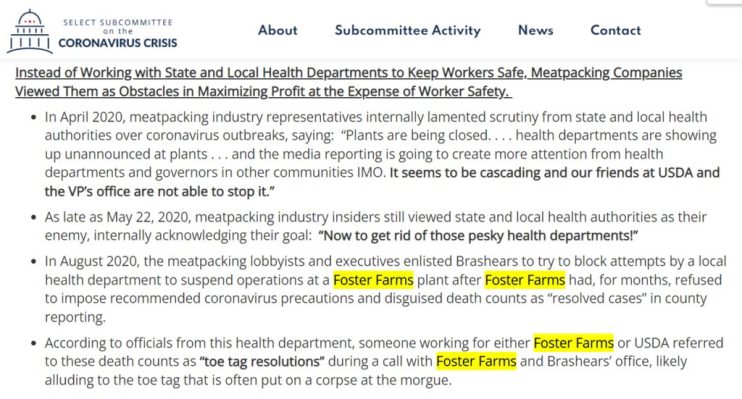California’s Foster Farms is among the meat packers accused of working with Trump administration officials to undermine the efforts of health officials during Coronavirus outbreaks at meatpacking plants.
The House Select Subcommittee on the Coronavirus Crisis released a report Thursday that says “meatpacking companies engaged Trump Administration political appointees in an aggressive campaign to force workers to remain in dangerous plants with high risk of coronavirus transmission.”
The subcommittee is chaired by Rep. James E. Clyburn (D-SC), who released the following statement with the report:
“The Select Subcommittee’s investigation has revealed that former President Trump’s political appointees at USDA collaborated with large meatpacking companies to lead an Administration-wide effort to force workers to remain on the job during the coronavirus crisis despite dangerous conditions, and even to prevent the imposition of commonsense mitigation measures. This coordinated campaign prioritized industry production over the health of workers and communities and contributed to tens of thousands of workers becoming ill, hundreds of workers dying, and the virus spreading throughout surrounding areas. The shameful conduct of corporate executives pursuing profit at any cost during a crisis and government officials eager to do their bidding regardless of resulting harm to the public must never be repeated.”
The report is titled “‘Now to Get Rid of Those Pesky Health Departments!’: How the Trump Administration Helped the Meatpacking Industry Block Pandemic Worker Protections.” You can find the full report by clicking here.
Foster Farms is named in several places in the report, which accuses the company of trying to use Trump Administration officials to sway the local health department from issuing health-related orders or closures. Hundreds of workers became ill with COVID-19 at the Foster Farms facilities in Livingston and nine died from the illness. The company was later fined by Cal-OSHA after the workplace safety administration found a dozen safety infractions. Foster Farms has plants in Turlock and Fresno, as well as plants in other states. According to its website, it employs about 12,000 people nationwide.



The Select Subcommittee says it based its report on more than 151,000 pages of documents collected from meatpacking companies and interest groups. During the investigation, Select Subcommittee staff conducted over a dozen survey calls with meatpacking workers, union representatives, former USDA and OSHA officials, and state and local health authorities; and held staff briefings with OSHA and with USDA. The Select Subcommittee also obtained information relevant to the investigation during transcribed interviews with a current CDC official and the former Trump Administration CDC Director.
According to the release from the Select Subcommittee, it began investigating coronavirus outbreaks at meatpacking plants owned by Tyson, JBS, and Smithfield in February 2021. It expanded the investigation in September 2021 to include Cargill and National Beef.
The Select Subcommittee’s investigation is ongoing.
Click here to read the report.

Sabrina Halvorson
National Correspondent / AgNet Media, Inc.
Sabrina Halvorson is an award-winning journalist, broadcaster, and public speaker who specializes in agriculture. She primarily reports on legislative issues and hosts The AgNet News Hour. She was recently named the 2024 Farm Broadcaster of the Year by the National Association of Farm Broadcasting and serves as a Council Member on the World Agriculture Forum. Sabrina is a native of California’s agriculture-rich Central Valley and now divides her time between California and North Dakota.










